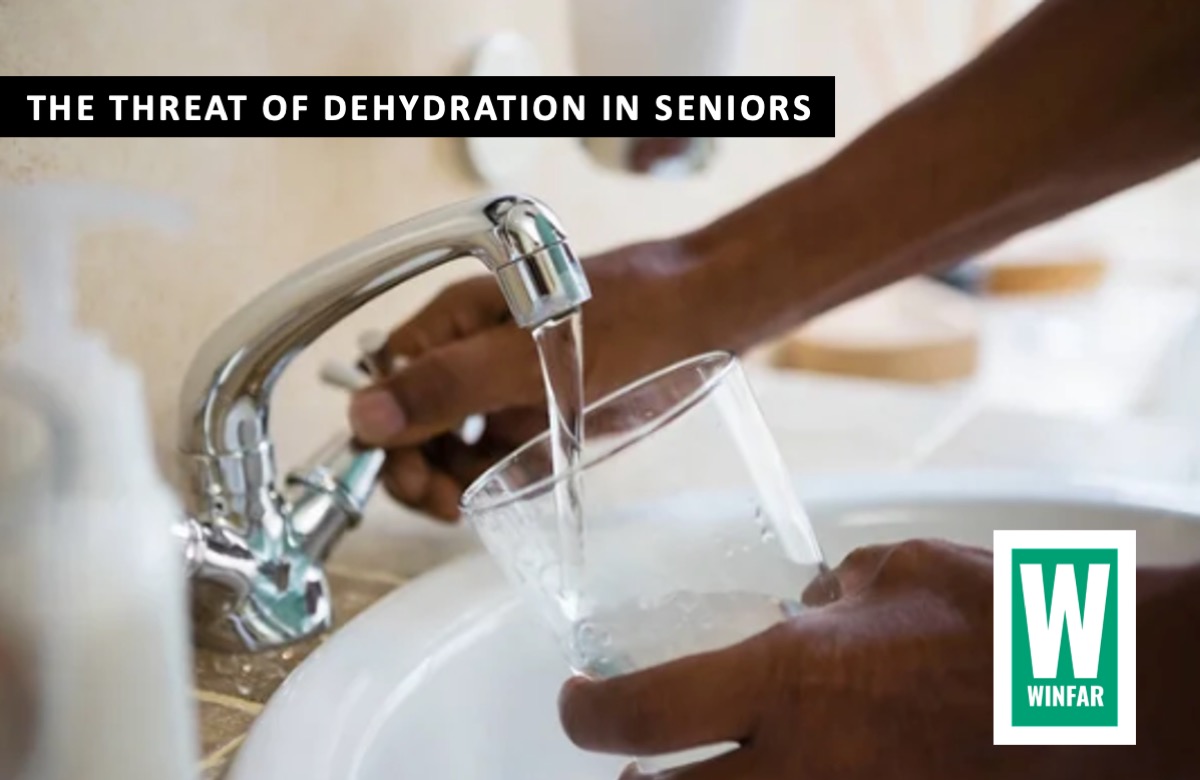Dehydration is dangerous for senior health
It’s summer. It’s hot! In these conditions, drinking enough water is important for everyone, but especially for older adults who are at greater risk for dehydration.
A study conducted by UCLA unveiled that a staggering 40% of seniors may be consistently under-hydrated.
That can easily lead to dehydration and cause a variety of serious health problems, including urinary tract infections (UTI), falls, kidney stones, and more.
Alarming statistics indicate that adults aged 65 and above exhibit the highest hospital admission rates due to dehydration. And, adults age 65 and up have the highest hospital admission rates for dehydration.
To help keep your older adult healthy and safe, we explain why dehydration is so common in seniors, mild and serious dehydration symptoms, the health risks of being dehydrated, how much water a person needs, and the benefits of staying hydrated.
Why is dehydration so common in seniors?
Seniors are predisposed to dehydration due to their naturally lower water content. Moreover, health conditions and medications amplify their risk, such as blood pressure medications that promote water elimination. Other factors contributing to dehydration include diminished sensitivity to thirst, decreased ability to keep fluid levels in balance in the body, less efficient kidneys resulting in more water in urine, and the side effects of medications like diarrhea or excessive sweating.
Recognising dehydration symptoms in seniors
Identifying early signs of dehydration in older adults is challenging, as they are often mistaken for other health conditions or medication side effects. However, it’s crucial to address mild dehydration promptly to prevent complications.
Mild dehydration symptoms include dry mouth, dark-colored urine, fatigue, dizziness, muscle cramps, headaches, weakness, irritability, and sleepiness.
Serious dehydration symptoms encompass low blood pressure, confusion, difficulty walking, a weak but rapid pulse, bloated stomach, wrinkled skin with no elasticity – try the “pinch test”, dry and sunken eyes, breathing faster than normal, severe cramping or muscle contractions and convulsions.
Health risks associated with dehydration in seniors
For seniors, being well hydrated is necessary for many medications to work properly. Dehydration can also cause serious health problems, including: heat stroke, fainting, urinary tract infections, kidney stones, seizures, blood clot complications, and hypovolemic shock.
How much water do seniors need?
For the average person, a general rule of thumb for how much water to drink each day is to take one-third of the person’s body weight in pounds and drink that number of ounces of water. For example, a 150 pound person would need 50 ounces of water daily, which is about six 8 ounce glasses of water.
Of course, if the weather is very hot or dry, they’d need to compensate by drinking more water than usual.
However, because each older adult takes different medications and has different health conditions, it’s important to talk with their doctor to find out how much water is best for their body.
The benefits of staying hydrated
Beyond averting health problems, staying well-hydrated yields several benefits for seniors, including reduced constipation, fewer falls, lower risk of urinary tract infections, potential reduction in bladder and colorectal cancer risk.
6 Ways to get seniors to drink more water
Ideally, we’d be able to prevent seniors from getting dehydrated, but it’s tough to increase someone’s fluid intake when they won’t cooperate.
To make it easier to keep your older adult hydrated, we share 6 creative tips for getting seniors to drink more water.
1. Remember that there are many sources of fluids
People don’t have to drink only plain water to get hydrated. Coffee, tea, fruit juice, sweetened beverages, fruits, and vegetables all contain water.
If dehydration is a serious issue for your older adult, but they really resist drinking healthy fluids, it may be necessary to make trade-offs like allowing them to drink less healthy options like sugary drinks or diet soda.
To be sure that the pros outweigh the cons and their overall health will benefit, speak with their doctor. first
2. Keep water close by at all times
Keeping water close on hand could encourage your senior to drink more water.
Try keeping a pitcher or bottle of water near their favourite seat to make it quick and convenient to take a drink.
3. Experiment with temperatures:
Your senior may prefer hot drinks to cold, or the other way around. Experiment to find out which type they like better. Try different things like warming up juices, making decaf iced coffee with cream, or adding plain soda water to make tea or juice bubbly.
4. Try savory options:
Some seniors may prefer hot soup broth as a flavorful alternative to sweet or neutral beverages.
5. Make popsicles:
Homemade popsicles made from fruit juice or a mix of juice and water are a great treat and a great way to get more fluids into your older adult.
6. Smoothies, milkshakes, Ensure, sports drinks:
If stubbornness persists, consider enticing seniors with smoothies, milkshakes, Ensure, or sports drinks.
Ultimately, tailoring hydration strategies to individual preferences and health considerations is essential for effectively addressing dehydration in seniors.

